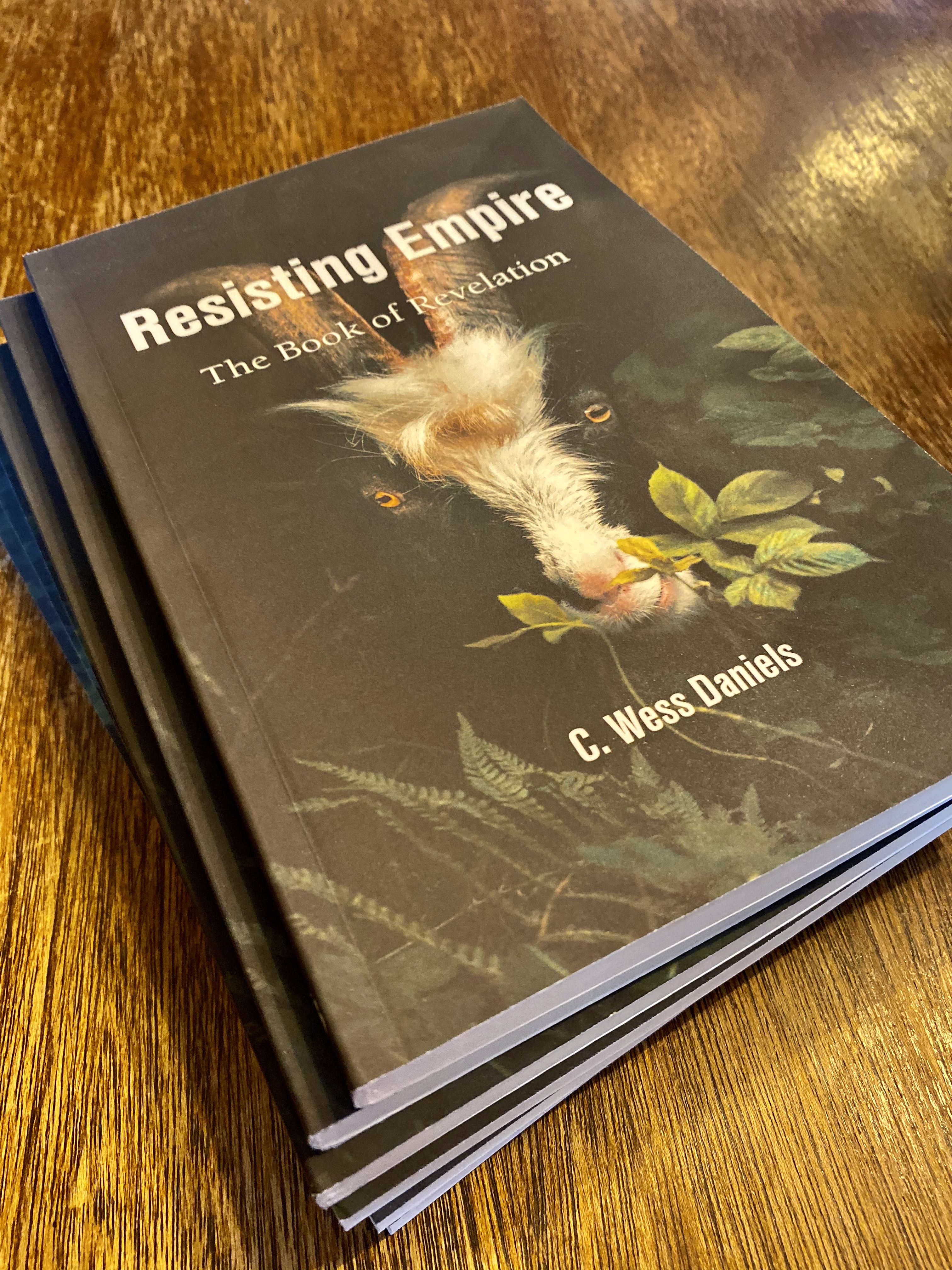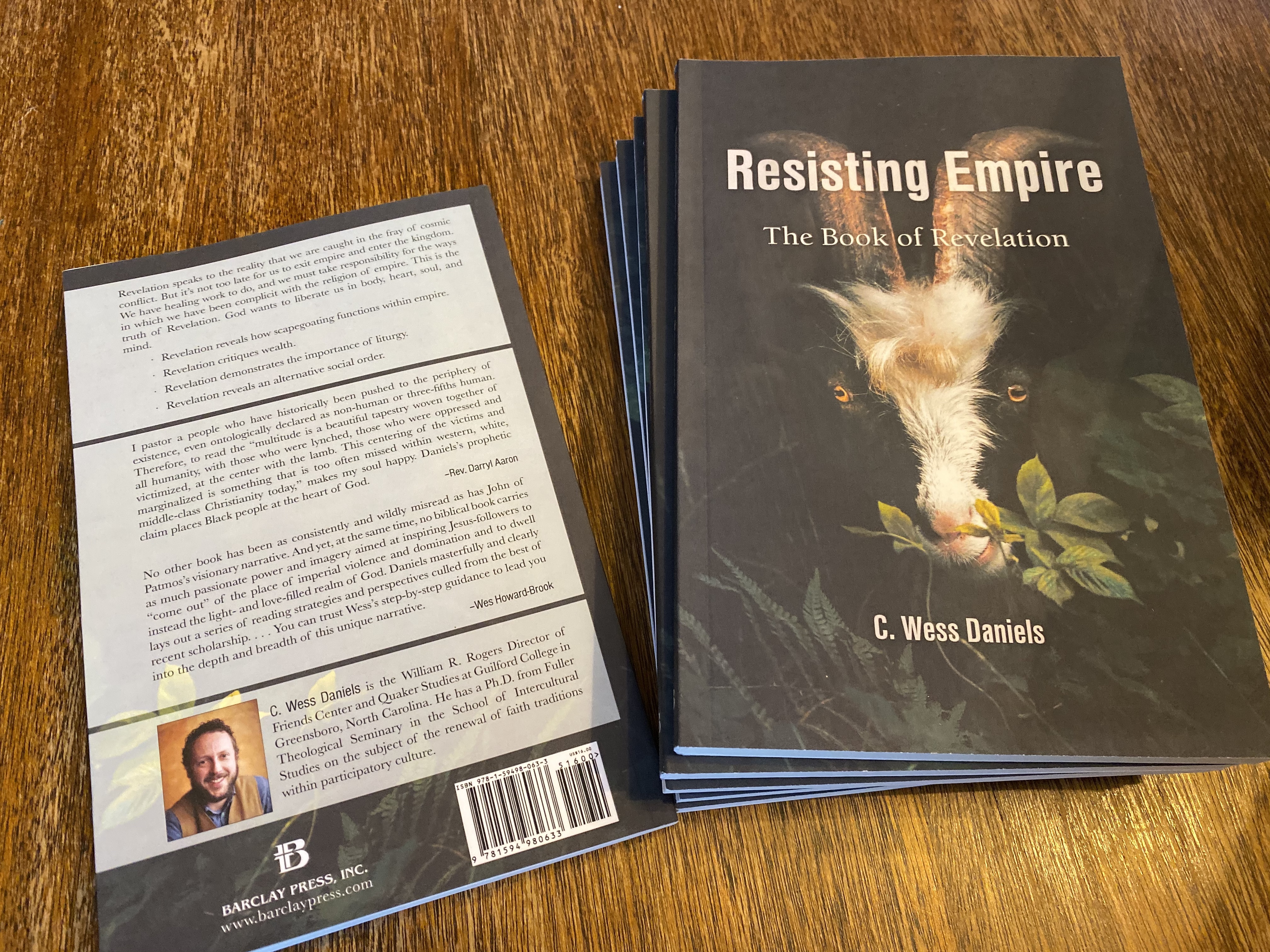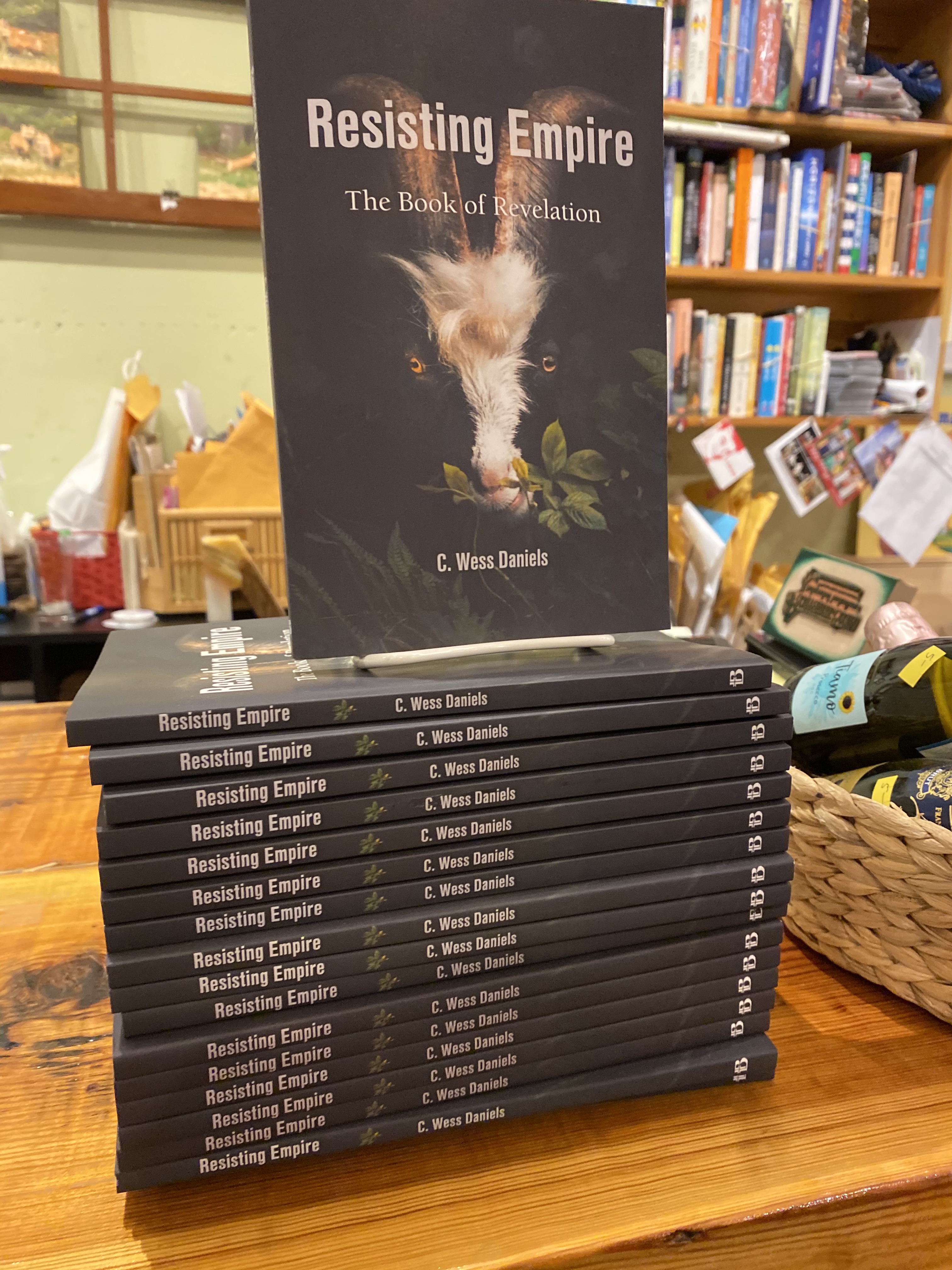Revelation as Resistance: Moral Imagination in an Age of Empire
How would you answer if I were to ask you, “What one book of the Bible are you least interested in studying, reading, discussing, or teaching others about?”
When I considered this question in the spring of 2013, as the pastor of a Quaker meeting in the Pacific Northwest, I knew the answer before I got to the end of the question: Revelation.
As far as I was concerned, this was a text of terror that even this bible scholar and hopeful liberation-theologian and Quaker preacher could not resuscitate. If there ever was a text that baffled me, and even more, repulsed me, especially in the way that “Christianity” had used it – it was Revelation.
Let me back up. I came to this question in a roundabout way. I grew up Catholic and then non-denominational, Evangelical Christian. I went to an Evangelical college, took a whole class on Revelation for Heaven’s sake. Even while I could debate pre and post-millenarian viewpoints with the best of them, I was critical of the concept of the rapture, turned off by the Scofield Bible, and scorned Dispensationalism. To top it off, the Left Behind Series happened, and September 11th happened, and countless predictions and judgments spewed forth often with the help of national press. When it came to Revelation, I negotiated release of the whole at the expense of surrendering this one small letter. In my view, it was too far gone. And not worth the fight.
Jump ahead a few years. As a pastor in a Quaker community in the Pacific Northwest, I became more and more influenced by liberation theology through the help of some friends, the work of the Poor People’s Campaign, the work of the Poverty Initiative at Union Theological Seminary. I began learning how to read the Bible from the margins, alongside people who were on the margins.
Then, by good fortune, I was invited to participate in one of Parker Palmer’s retreats for younger leaders. I jumped at the chance. I knew who he was and knew that many Friends looked up to him, but had not yet personally connected with his work. During that weekend retreat, which was one of the most impactful retreats I’ve ever been on, Parker Palmer said something that stuck with me. When talking about how he arrives at topics for writing and research, he said, “I only write books about things that truly baffle me, things that keep me awake late at night.” He was saying that it is the unfamiliar, the puzzling, perhaps even the things he’s resistant to that motivates his curiosity, and animates his work. I loved that. I felt both challenged and freed to see preaching as a way to “lean in” to my bafflement.
So back in my study, during the spring of ’13, I thought I’d try out this new practice of Holy Bafflement. In prayer and reflection, I asked the question stated above: what in the book of the Bible that I’d least want to preach? What is the book that most baffles me?
I knew instantly. At that moment, I wanted to take it back. It was almost as though God had been waiting for me to ask the question. I reflected in the silence about what was coming up. I felt God’s prompting, “Don’t you think there are others who have looked at this text in different ways? Aren’t you curious about what is possible here?”
That began my journey to understand not just what Revelation was about, but more importantly, how to read Revelation, and what the text was trying to do some 2000 years ago? Resisting Empire: The Book of Revelation as Resistance is the result of this long journey. It is grappling with my own identities as a white, straight, educated male living in the American Empire, learning how to read texts written by and for the poor as a person with plenty of privilege that led to a much deeper conversion. One that helped me see this text, and many others like it, not as some paranoid dream or bad trip, but a liberatory manifesto of God’s people living under oppression.
“Something very strange happens when happens when this text is appropriated by readers in a comfortable, powerful, majority community: it becomes a gold mine for paranoid fantasies and for those who want to preach revenge and destruction.”
-Elisabeth Schüssler Fiorenza (Revelation: Visions of a Just World)
In the time since, I researched and studied many other scholars who have already traversed Revelation from new perspectives, primarily liberation theologians, and feminists biblical scholars, and worked on translating this into sermons and reflections for people who are wrestling with what it means to be both victims and agents of empire. Following this, I’ve been invited to preach and teach Revelation in meetings and congregations as diverse as Liberal Unprogrammed, Programmed meetings, and Baptist congregations. Apparently, there are baffled people hungry for new interpretations of Revelation everywhere! The most fun I’ve had recently was working with a group of Quaker college students where I now work to read and study the book together and wrestle with its overall meaning.
What has captivated me and others about this “unsalvageable” book of the Bible? I can assure you it is not because we think it offers the key to unlock the secret code of the Trump administration, or what we can finally do with Hilary’s emails. Nor do I believe it predicts that the 1000 year reign of Christ’s judgment is now upon us (though it does sometimes feel like there could be more judgment pointed at a few!). Nor is it meant to help us determine who the real infidels are. (I know this is how this text has been used and abused against so many people I and you love, and probably against some of you reading this right now.)
I am sorry that a text of this magnitude has been co-opted to do so much harm. I hope that in some small way, this work can help repair the breach. I also hope that this approach can help Christians everywhere become far more critical of empires everywhere.
Therefore, instead of Revelation being a book about “evacuation theology,” to use Rob Bell’s phrase, I argue that the book of Revelation has nothing to do with predicting when the end times will happen, and everything to do with how small, marginalized faith communities survive and resist empire.
How might Revelation help us in thinking about moral imaginations in our own day and age?
The author of Revelation identifies as John, a pastor and prisoner of the Roman Empire on the Island of Patmos, an Alcatraz like prison where Rome kept its prisoners. Like Rev. Dr. Martin Luther King, Jr. Imprisoned in Birmingham, Alabama, Pastor John scrawls his letter and has it smuggled out of the prison cell to his seven churches in Asia Minor. The letter – we now know as Revelation – called the early Christians to be more faithful in their resistance and to not give in to the ideology of the Roman empire, even if it meant death. It is urgent. It is apocalyptic. Its position is that the followers of the Lamb will not comprise with empire. Full stop. In John’s case, these seven small Judeo-Christian congregations lived under the oppressive Roman imperial regime; in Rev. Dr. Martin Luther King, Jr’s, it is Southern clergy tempted by white supremacy and middle-class safety. Feminist Scholar Elisabeth Schüssler Fiorenza was the one who suggested reading John and King side by side, to note their parallels, to note their shared contexts, and challenges. It was reading John and King together that I realized to make it about end times is to gut Revelation of its real power.
I’m convinced that this 1st-century letter is a challenging and fierce plead for these marginalized faith communities to not assimilate into what Wes Howard Brook calls “the Religion of Empire,” but to remain rooted in and have one’s moral imagination shaped by “the religion of the Lamb that was Slain:” an image that is meant to spark non-violent resistance – “the War of the Lamb,” not some end-times paranoia.
To put this simply: we are not the intended audience of Revelation.
Revelation is a pastoral letter read allowed in the early church’s gatherings and is addressed to specific communities under specific concerns; I believe when we start from this place it can become useful for us in a new way. It takes about an hour and twenty minutes to read out loud all together, a long sermon for us, but one that was meant to provide shape to the early Christian moral imagination, counter-imagery to the imagery of the religion of empire. I see Revelation offering four counter practices and outline them in Resisting Empire if you are interested in digging in deeper.
According to the author of Revelation, the church is to not just offer a counter-narrative and counter-practices to the religion of empire, it is to create a community that can exist within that counter-narrative: to resist and refuse assimilation into empire demonstrates faithfulness.
This leaves me, and I hope you, with lots of questions about how we resist empire in our world today?
- What does it mean to be faithful to “the Lamb that was slain?”
- Where have we already assimilated, and what does it mean to come out of empire?
- How do I grapple with the reality that I am both agent and victim of empire?
- Do I treat and think of others in ways that creat mob mentalities and scapegoats, or do I see all human beings in all their complexities as children of God?
I want to draw on one simple example from Revelation as a means of opening up these questions further: the importance of liturgy in shaping social order. Liturgy means “the work of the people,” and is about the kinds of things we do together that shape us in ways that mirror the empire or the Lamb. In other words, the book of Revelation reveals that there is a contrast between the “liturgy of empire” and the “liturgy of the Lamb.”
On the one hand, the Roman Empire has its own ceremonies, rituals, symbols, language, mantras, and sacrifices or “scapegoats.” These helped it to maintain its boundaries over and against other nations and wicked others. This is a liturgy of extraction, one that pulls people away from the suffering of their neighbors and the world around it. It distracts and displaces.
On the other hand, Revelation reveals the Lamb that was Slain has its own liturgy as well. This liturgy is one that is shaped and formed by non-violent resistance – the image of the Lamb slain, rooted in silence, and pulls the worshippers into the presence and awareness of the suffering other. In Revelation, worship centers the victims of empire [7:9-17]. This liturgy has no need for boundaries of us vs. them in order to create social cohesion; it is described as a multitude. It has no need for scapegoats because the Lamb was the last scapegoat who reveals the lie of the “scapegoat mechanism,” demonstrating that the scapegoat is innocent. And because it centers the victims of empire it is a radically inclusive and diverse multitude made up of people of every nation, tribe, and language.
After this I looked, and there was a great multitude that no one could count, from every nation, from all tribes and peoples and languages, standing before the throne and before the Lamb, robed in white, with palm branches in their hands.
Revelation 7:9
I believe, with a potent enough liturgy, an entirely different kind of social order can be created, one that has no need for scapegoats, and one that lifts up and centers those slaughtered and disinherited by empire: the prisoner, sex worker, homeless, unemployed, refugee, profiled, displaced, abused, lynched, disabled, bombed, bulldozed, walled-in, walled-out, rejected and refused. To consider that all these things happen to human beings in the name of empire should devestate us.
I know there are plenty who have many different feelings about the Bible; many have written it off and surrendered it to other interpretations just like I did with Revelation. However, in the process of doing this work first in my community and second for the book, I’ve become convinced that Revelation is not about what we’ve been taught, and we lose something very powerful, putting ourselves at risk of not only having nothing to say in the face of empire, but we are made vulnerable to assimilating into empire without these kinds of counterstories and practices.
Early Quaker loved the book of Revelation, and I think it was in large part because its imagery and language helped them to identify the religion of empire in their time. How might our imaginations and practices be reshaped by this text, in ways that we have lost due to our dismissal of the text? I have grown and learned a lot and have so far still to go to understand more fully. But for now and if nothing else, I am helped to know that for 2000 years, there have been followers of Jesus existing within and resisting empire leading the way for the rest of us.
Get “Resising Empire: The Book of Revelation as Resistance” Below



Ways to Connect with Wess:
If you like this post and/or have feedback you’d like to share you can connect with me on Mastadon: @wess@writing.exchange or through the Contact
*Photo credit Christopher Dombres